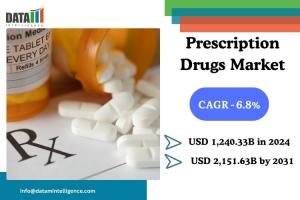Prescription Drugs Market to Reach USD 2.15 Trillion by 2031, Driven by Innovation and Demand | DataM Intelligence
Prescription drug market expands rapidly due to AI in pharma, rising diseases, and global access to advanced therapies.
Download Exclusive Sample Report Here: https://datamintelligence.com/download-sample/prescription-drugs-market
Market Dynamics and Growth Drivers
Several factors are converging to accelerate the market’s growth:
Increasing prevalence of chronic diseases such as cancer, cardiovascular disorders, and diabetes has heightened demand for long-term pharmacological management.
Aging global population is contributing significantly, particularly in developed countries where life expectancy continues to rise.
Biotechnological advancements and the growing adoption of personalized medicine have led to the development of targeted therapies that offer better efficacy and safety profiles.
Rising healthcare expenditure and favorable reimbursement systems are enhancing accessibility to prescription medications.
Government healthcare reforms, particularly in the U.S. and Japan, are reshaping pricing, coverage, and access.
Regional Outlook
North America
North America remains the dominant force in the global prescription drugs market. The United States, in particular, accounts for a substantial share due to its well-established pharmaceutical ecosystem, advanced healthcare infrastructure, and high per capita healthcare spending. Strategic initiatives by key players and ongoing regulatory reforms like the Inflation Reduction Act are also reshaping drug pricing and accessibility in the region.
Europe
Europe follows closely, with countries such as Germany, France, and the UK spearheading innovation. While stringent regulatory requirements can slow product approvals, the region benefits from high awareness, supportive public healthcare systems, and a strong tradition of pharmaceutical R&D.
Asia-Pacific
The fastest-growing region is Asia-Pacific. Countries like India, China, and Japan are witnessing robust demand growth due to increasing urbanization, better healthcare access, and government-led initiatives to expand universal healthcare. Japan remains a key contributor with its aging population and strong domestic pharmaceutical production capabilities.
Leading Companies
F. Hoffmann-La Roche Ltd
Mylan N.V.
Teva Pharmaceutical Industries Ltd
Sanofi
Pfizer Inc
GlaxoSmithKline plc
Novartis AG
Merck & Co Inc
Allergan
Dr. 'Reddy's Laboratories Ltd
Innovation and Technology Integration
Biopharmaceutical advances and the integration of artificial intelligence in drug discovery are revolutionizing the prescription drug development pipeline. AI models are increasingly being used to predict molecule behavior, reducing trial-and-error phases and accelerating time-to-market. Moreover, mRNA technology, popularized during the COVID-19 pandemic, is now being adapted for other diseases like cancer and rare genetic disorders.
Latest News of USA
In the United States, prescription drug pricing remains at the forefront of healthcare policy. A critical update came with the ongoing rollout of provisions from the Inflation Reduction Act, which allows Medicare to negotiate prices on select high-cost drugs. While the scope is limited initially, it signals a paradigm shift that could pressure manufacturers to reevaluate pricing strategies, especially for blockbuster drugs.
Additionally, 2025 is anticipated to bring sharper scrutiny on obesity treatments, with major insurers and pharmacy benefit managers under pressure to include newer, high-demand medications like GLP-1 receptor agonists (e.g., Ozempic, Wegovy) in their reimbursement lists. These drugs have gained popularity for both diabetes and weight loss but come with steep price tags.
Another trend gaining momentum is the rise of direct-to-consumer digital pharmacies, such as Amazon Pharmacy and Mark Cuban Cost Plus Drug Company, which aim to improve transparency and reduce middleman markups. This tech-driven disruption is reshaping how Americans access and purchase medications.
Latest News of Japan
Japan is making strategic moves to reassert itself as a global leader in drug innovation. In 2024, the Japanese government announced a national strategy to boost drug discovery capabilities, emphasizing public-private partnerships and incentives for venture capital investment. This initiative seeks to reverse a recent slowdown in new drug launches and attract international biotech firms to set up R&D centers in Japan.
However, Japan continues to grapple with drug supply disruptions, driven by compliance issues related to Good Manufacturing Practices (GMP). Since 2020, several domestic manufacturers have faced production halts, leading to nationwide shortages of essential medicines. The government has responded by tightening regulatory oversight and incentivizing production process improvements.
Market Segmentation:
By Type: Branded, Generic.
By Therapy Area: Oncology, Immunology, Ophthalmology, Respiratory, Gastroenterology, Gynecology, Others.
By Route of Administration: Oral, Topical, Parenteral, Others.
By Sales Channel: Online, Offline.
By Region: North America, Europe, South America, Asia Pacific, Middle East, and Africa.
Conclusion
The global prescription drugs market is poised for sustained and transformative growth. As therapeutic innovation accelerates and health systems evolve, prescription medicines will play a central role in managing disease burdens and improving quality of life worldwide. While mature markets like the U.S. and Japan tackle pricing reforms and supply chain resilience, emerging regions are gearing up to meet the growing demand for accessible and affordable therapies.
The landscape ahead is one of opportunity and challenge marked by scientific breakthroughs, shifting regulations, and a clear imperative for companies to innovate not just in the lab, but across the entire value chain.
Stay informed with the latest industry insights-start your subscription now: https://www.datamintelligence.com/reports-subscription
Related Reports:
Generic Drugs Market
Antiemetic Drugs Market
Sai Kumar
DataM Intelligence 4market Research LLP
+1 877-441-4866
email us here
Visit us on social media:
LinkedIn
X
Legal Disclaimer:
EIN Presswire provides this news content "as is" without warranty of any kind. We do not accept any responsibility or liability for the accuracy, content, images, videos, licenses, completeness, legality, or reliability of the information contained in this article. If you have any complaints or copyright issues related to this article, kindly contact the author above.
OneWell Health Care Expands to Georgia, Launching Pediatric, Veteran, and Private Home Care Services
Oliver Domínguez Releases 'Lost' on July 4: A Rock & World Music Anthem of Healing and Self-Discovery
Medical Supplierz Introduces AI-Powered Search to Enhance B2B Buyer-Supplier Matching
Więcej ważnych informacji
 Jedynka Newserii
Jedynka Newserii

 Jedynka Newserii
Jedynka Newserii

Konsument

Proces deregulacji nie dotyczy branży tytoniowej. Jest propozycja kolejnej ustawy w ciągu kilku miesięcy
Najpierw wprowadzenie podatku akcyzowego na saszetki nikotynowe, potem propozycja przepisów, które zmierzają do wycofania tych produktów z rynku – przedstawiciele środowisk biznesowych podkreślają, że przygotowywane przez resort zdrowia przepisy wprowadzają chaos legislacyjny w branży tytoniowej. To tym bardziej dziwi przedsiębiorców, że stoi w opozycji do prowadzonego przez rząd procesu deregulacji w gospodarce. W dodatku może mieć negatywne skutki dla budżetu państwa i doprowadzić do skokowego wzrostu szarej strefy.
Bankowość
Grzyby rozkładające tekstylia nagrodzone w konkursie ING. 1 mln zł trafi na innowacyjne projekty dla zrównoważonych miast

Firma Myco Renew, która opracowała technologię rozkładającą tekstylia za pomocą grzybów, została laureatem siódmej edycji Programu Grantowego ING. Motywem przewodnim konkursu skierowanego do start-upów i młodych naukowców był tym razem zrównoważony rozwój miast i społeczności. Łącznie na nagrodzone innowacyjne projekty trafił 1 mln zł. Wśród nich są także bezzałogowe statki powietrzne dostarczające defibrylatory czy system do zbierania deszczówki w blokach.
Prawo
Trwają próby wzmocnienia dialogu społecznego. Niespokojne czasy wymuszają większe zaangażowanie społeczeństwa w podejmowanie decyzji

Według zapowiedzi szefowej Komisji Europejskiej Ursuli von der Leyen głos partnerów społecznych i dialog społeczny będą stały w centrum procesu decyzyjnego w Europie. Taki jest cel podpisanego w marcu Paktu na rzecz europejskiego dialogu społecznego. Potrzeba wzmocnienia głosu społeczeństwa jest również podkreślana na forum krajowym. Rząd planuje reformę Rady Dialogu Społecznego, by usprawnić pracę tej instytucji, a przedsiębiorcy wzywają do rzetelnego konsultowania ze stroną społeczną ustaw, które wychodzą z rządu.
Partner serwisu
Szkolenia

Akademia Newserii
Akademia Newserii to projekt, w ramach którego najlepsi polscy dziennikarze biznesowi, giełdowi oraz lifestylowi, a także szkoleniowcy z wieloletnim doświadczeniem dzielą się swoją wiedzą nt. pracy z mediami.








.gif)

 |
| |
| |
|